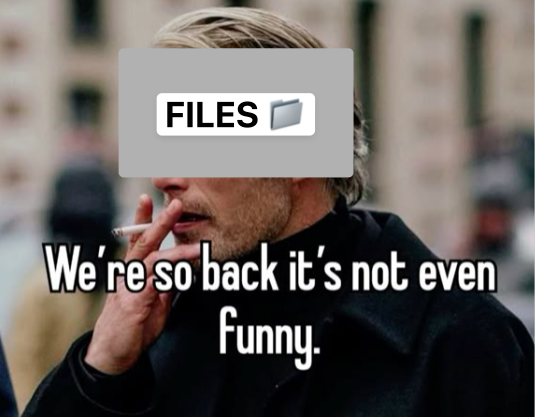Over the past 15 years, in what is referred to as the cloud collaboration era, we talked about the death of the file. This seems trite now, but this was a huge deal at the time.
As Fred Wilson wrote in a 2011 blog post “There will be no files in the cloud”:
“This is why I love Google Docs so much. I just create a document and email a link. Nobody downloads anything. There are no attachments in the email. Just a link. Just like the web, following links, getting shit done. I love it. That's the future. I'm pretty sure of it. Mobile is a bit of a complicating factor because we are still stuck with downloadable software and unreliable and slow internet connections. But I think we'll fix all of that in good time.”
The idea was no longer needed files, everything was just a record in a database. We didn’t have desktops full of .doc and .xls files. “_FINAL_READY_v7.pdf” would be a thing of the past.
The shift from local files to cloud collaboration bought with it a bunch of benefits. Collaboration in real time, auto-save, easy version history, access from anywhere, strong permissions control.
So largely, the file has died. Yes, files live on for boomers and every interaction with the government, but for the most part we’ve transitioned most of the work we do to the browser and the cloud.
I want to be really clear before we proceed, this has been a great trend.
However, I have recently begun to sense a slight reversal in this trend. Very early signs, flickers, but some small cracks in the cloud collaboration walls.
I’ve started to see the benefits of files again. Because of AI and agents.
Let me illustrate this with a real life example from last week.
We’re looking at rebuilding and improving our knowledge base, which is currently built and hosted using the Hubspot CMS platform.
We’ve been experimenting with using Claude Code and a Playwright MCP server to help us get closer to “self driving documentation”. An always on agent to review our product and keep docs up to date and accurate.
To do this though, we needed to have every article as a file locally, so the AI could work on them in batches.
Suddenly, having files locally is a feature, not a bug.
I can prompt my knowledge base with things like: “For every article, update the product name from ProductX to ProductX+” or “Find all articles that have dead links and update them”.
This would be way harder if Claude Code didn’t have access to the articles as files locally. Sure, this could work using a CMS API or MCP, but having files locally makes this quite effortless.
You also/still get all the benefits of proper version control, review/approval steps etc.
You also get insane speed.
File-first CMS’ and static site generators could emerge as a viable option for marketers and startups that want to work at lightning speed.
I actually think we could see this in a ton of verticals. CMS is the obvious one, but I wonder at what point we could see marketing automation follow the same pattern. Create all your emails and journeys and automations via something like Claude Code in a terminal, then push/publish live.
The counter to all of this is this way of working is far too technical for most knowledge workers. That is probably true today.
But it feels like the fastest and most efficient way to work. What’s old is new again?



love this!
effortless and super fast are reasons why files become great again!
plus CC just makes this whole possible and cool again